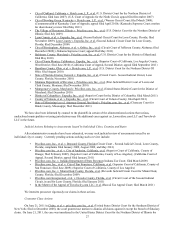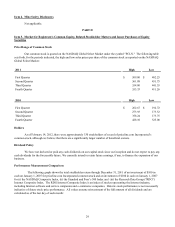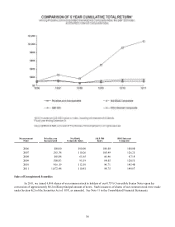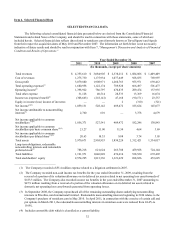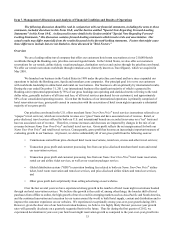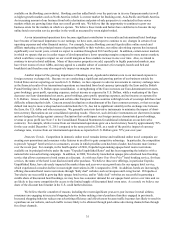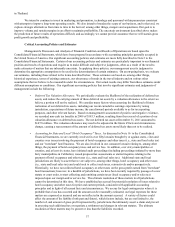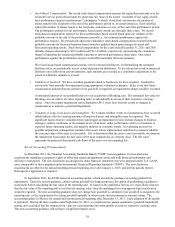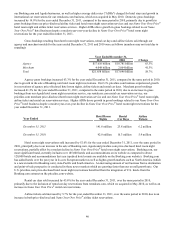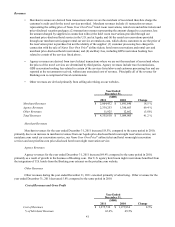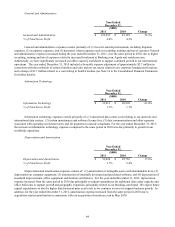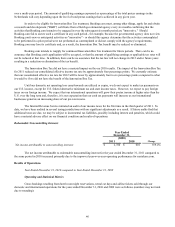Priceline 2011 Annual Report Download - page 38
Download and view the complete annual report
Please find page 38 of the 2011 Priceline annual report below. You can navigate through the pages in the report by either clicking on the pages listed below, or by using the keyword search tool below to find specific information within the annual report.37
in Thailand.
We intend to continue to invest in marketing and promotion, technology and personnel within parameters consistent
with attempts to improve long-term operating results. We also intend to broaden the scope of our business, and to that end, we
explore strategic alternatives from time to time in the form of, among other things, mergers and acquisitions. Our goal is to
improve volume and sustain margins in an effort to maintain profitability. The uncertain environment described above makes
the prediction of future results of operations difficult, and accordingly, we cannot provide assurance that we will sustain gross
profit growth and profitability.
Critical Accounting Policies and Estimates
Management's Discussion and Analysis of Financial Condition and Results of Operations are based upon the
Consolidated Financial Statements, which have been prepared in accordance with accounting principles generally accepted in
the United States of America. Our significant accounting policies and estimates are more fully described in Note 2 to the
Consolidated Financial Statements. Certain of our accounting policies and estimates are particularly important to our financial
position and results of operations and require us to make difficult and subjective judgments, often as a result of the need to
make estimates of matters that are inherently uncertain. In applying those policies, our management uses its judgment to
determine the appropriate assumptions to be used in the determination of certain estimates. On an on-going basis, we evaluate
our estimates, including those related to the items described below. Those estimates are based on, among other things,
historical experience, terms of existing contracts, our observance of trends in the travel industry and on various other
assumptions that we believe to be reasonable under the circumstances. Our actual results may differ from these estimates under
different assumptions or conditions. Our significant accounting policies that involve significant estimates and judgments of
management include the following:
• Deferred Tax Valuation Allowance. We periodically evaluate the likelihood of the realization of deferred tax
assets, and reduce the carrying amount of these deferred tax assets by a valuation allowance to the extent we
believe a portion will not be realized. We consider many factors when assessing the likelihood of future
realization of our deferred tax assets, including our recent cumulative earnings experience by taxing
jurisdiction, expectations of future income, the carryforward periods available to us for tax reporting
purposes, and other relevant factors. Based on management's assessment of positive and negative evidence,
we recorded non-cash tax benefits in 2009 of $183.3 million, resulting from the reversal of a portion of our
valuation allowance on deferred tax assets. The net deferred tax asset at December 31, 2011 amounted to
$147.8 million. The valuation allowance may need to be adjusted in the future if facts and circumstances
change, causing a reassessment of the amount of deferred tax assets more likely than not to be realized.
• Accounting for State and Local "Hotel Occupancy" Taxes. As discussed in Note 16 to the Consolidated
Financial Statements, we are currently involved in over fifty lawsuits brought by or against states, cities and
counties over issues involving the payment of hotel occupancy and other taxes (i.e., state and local sales tax)
and our "merchant" hotel business. We are also involved in one consumer lawsuit relating to, among other
things, the payment of hotel occupancy taxes and service fees. In addition, over sixty municipalities or
counties, and at least six states, have initiated audit proceedings (including proceedings initiated by more than
forty municipalities in California), issued proposed tax assessments or started inquiries relating to the
payment of hotel occupancy and other taxes (i.e., state and local sales tax). Additional state and local
jurisdictions are likely to assert that we are subject to, among other things, hotel occupancy and other taxes
(i.e., state and local sales tax) and could seek to collect such taxes, retroactively and/or prospectively.
Historically, we have not collected hotel occupancy or other taxes on the gross profit earned from "merchant"
hotel transactions; however, in a handful of jurisdictions, we have been recently required by passage of a new
statute or court order, to start collecting and remitting certain taxes (local occupancy and/or sales tax)
imposed upon our margin and/or service fee. The ultimate resolution of these matters in all jurisdictions
cannot be determined at this time. We have established an accrual for potential resolution of issues related to
hotel occupancy and other taxes for prior and current periods, consistent with applicable accounting
principles and in light of all current facts and circumstances. We accrue for legal contingencies where it is
probable that a loss has occurred and the amount can be reasonably estimated; our legal expenses for these
matters are expensed as incurred and are not reflected in the amount accrued. A variety of factors could
affect the amount of the liability (both past and future), which factors include, but are not limited to, the
number of, and amount of gross profit represented by, jurisdictions that ultimately assert a claim and prevail
in assessing such additional tax or negotiate a settlement and changes in relevant statutes. The ultimate
resolution of these matters may be greater or less than the liabilities recorded.


